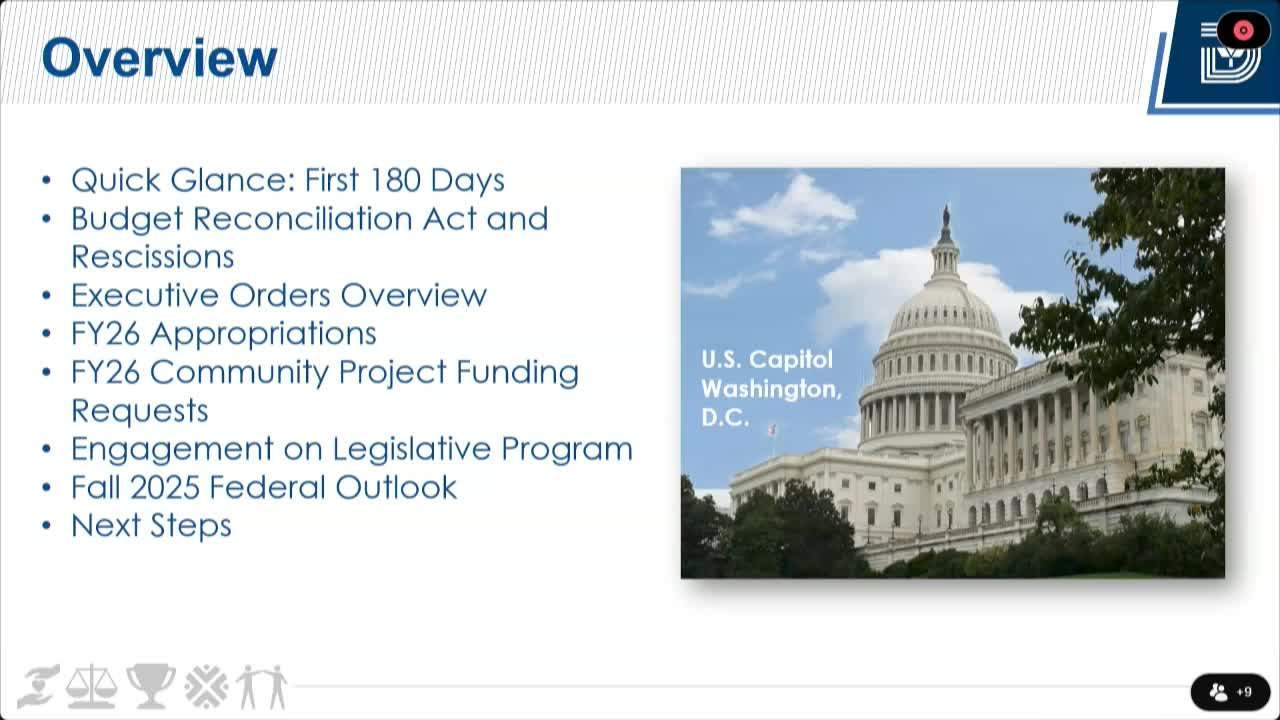Dallas City Advocates for Federal Funding Amid Legislative Changes and Appropriations Process
August 05, 2025 | Dallas, Dallas County, Texas
This article was created by AI summarizing key points discussed. AI makes mistakes, so for full details and context, please refer to the video of the full meeting. Please report any errors so we can fix them. Report an error »

The Dallas Ad Hoc Committee on Legislative Affairs convened on August 5, 2025, to discuss critical updates regarding federal legislative processes and their implications for the city. The meeting focused on the ongoing reconciliation process, appropriations, and the city's engagement with federal representatives to advance Dallas's priorities.
Committee members highlighted the legislative landscape in Washington, D.C., noting that Congress has introduced over 8,000 bills this session, with only 27 enacted into law. Key legislation discussed included the full-year continuing appropriations and extensions act, which funds the government until September 30, and the Budget Reconciliation Act, known as HR 1, which was signed into law on July 4. This act made several provisions from the 2017 Tax Cuts and Jobs Act permanent, significantly impacting local governments.
The committee emphasized the importance of municipal bonds, which retain their tax-exempt status under the new law, crucial for financing infrastructure projects in Dallas. Additionally, the act permanently increases the low-income housing tax credit and establishes the new market tax credit program, both vital for affordable housing initiatives in the city.
However, the meeting also addressed concerns regarding rescissions of unobligated funds from programs authorized under the 2022 Inflation Reduction Act, which could affect climate, energy, and infrastructure funding. Changes to Medicaid and SNAP programs were also discussed, with potential implications for local service providers and access to benefits.
The committee reviewed the city's advocacy efforts in Washington, including meetings with Texas senators and representatives to secure funding for community projects. Dallas submitted 28 project requests, with 17 advancing to the current stage, potentially bringing in $15 million for local initiatives. However, the committee cautioned that without a completed appropriations package, funding remains uncertain.
Looking ahead, the committee anticipates challenges in the fiscal year 2026 appropriations process, with strict caps on discretionary spending and potential delays in passing the budget. The committee will continue to monitor developments and engage with federal partners to ensure Dallas's interests are represented.
In conclusion, the meeting underscored the city's proactive approach to navigating federal legislative processes, advocating for essential funding, and preparing for upcoming challenges in the appropriations landscape.
Committee members highlighted the legislative landscape in Washington, D.C., noting that Congress has introduced over 8,000 bills this session, with only 27 enacted into law. Key legislation discussed included the full-year continuing appropriations and extensions act, which funds the government until September 30, and the Budget Reconciliation Act, known as HR 1, which was signed into law on July 4. This act made several provisions from the 2017 Tax Cuts and Jobs Act permanent, significantly impacting local governments.
The committee emphasized the importance of municipal bonds, which retain their tax-exempt status under the new law, crucial for financing infrastructure projects in Dallas. Additionally, the act permanently increases the low-income housing tax credit and establishes the new market tax credit program, both vital for affordable housing initiatives in the city.
However, the meeting also addressed concerns regarding rescissions of unobligated funds from programs authorized under the 2022 Inflation Reduction Act, which could affect climate, energy, and infrastructure funding. Changes to Medicaid and SNAP programs were also discussed, with potential implications for local service providers and access to benefits.
The committee reviewed the city's advocacy efforts in Washington, including meetings with Texas senators and representatives to secure funding for community projects. Dallas submitted 28 project requests, with 17 advancing to the current stage, potentially bringing in $15 million for local initiatives. However, the committee cautioned that without a completed appropriations package, funding remains uncertain.
Looking ahead, the committee anticipates challenges in the fiscal year 2026 appropriations process, with strict caps on discretionary spending and potential delays in passing the budget. The committee will continue to monitor developments and engage with federal partners to ensure Dallas's interests are represented.
In conclusion, the meeting underscored the city's proactive approach to navigating federal legislative processes, advocating for essential funding, and preparing for upcoming challenges in the appropriations landscape.
View full meeting
This article is based on a recent meeting—watch the full video and explore the complete transcript for deeper insights into the discussion.
View full meeting
